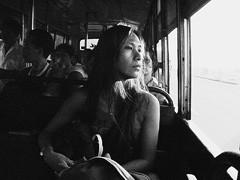American Alley
 KOREA / 2008 / Korean, English and others / Color / Video / 90 min
KOREA / 2008 / Korean, English and others / Color / Video / 90 min
Director, Photography: Kim Dong-ryung
Editing: Kim Dong-ryung, Park Kyoung-Tae
Second Camera: Park Kyoung-Tae, Song Jin-young, Um Hae-jung
Music: Siwa
Sound Design: Pyo Yong-soo (Mediact)
Distribution Company: Cinema DAL www.cinemadal.com
American Alley lies in a corner of Dongduechon, a city where US military bases occupy 40% of the available land. The film traces the history of this base town through “K,” a Korean woman who has worked here for over 40 years, and explores the present, where Russian and Filipina women work in the clubs around the base under constant threat of exposure and deportation as “illegal laborers.” Back to back with the structural (sexual) violence of the American bases, the women construct their lives with American soldiers and women from their hometowns, carving out a future with their own hands, entrusting their lives to this place.
[Director’s Statement] Koreans have long considered “base towns” to be synonymous with shame and resentment. Many Korean women worked in clubs catering to American GIs, but during the rapid growth of the Korean economy, their places were taken by female entertainers from the Philippines and Russia, a fact that few Koreans are aware of.
I decided to make the documentary American Alley after I came to work at a women’s center called Durebang, in the base town of Uijeongbu, in 2004. As a project staff at Durebang, I worked for a year as a counselor doing crisis intervention for women in American Alley. During that hectic year, I learned about the political and social position these women are placed in, and I also witnessed very personal moments in their lives.
I didn’t initially intend to include Grandma K in my documentary. Some said that she had had been a “comfort woman” for the Japanese military because she spoke Japanese well, but I thought she was just one of many women who had no choice but to enter the sex trade in order to survive the hardships of the war.
It was challenging to shoot Russian women for my documentary, and whenever I felt frustrated about the progress of the film, it was always at Grandma K’s house that I could relax and make myself at home. I’d take a nap, she’d cook for me, and as I became familiar with her daily life, I decided to film her.
While I was shooting the film and, later, as I was editing, my biggest dilemma was where to position myself in these women’s lives. It might have been a much more interesting film if I had placed the relationship between me and the women in American Alley at the center of the film. But I felt it was more important to focus entirely on their lives.
 Kim Dong-ryung
Kim Dong-ryung
Kim studied English literature at Ewha Womans University and film directing at the Korean Academy of Film Arts. She made an experimental 16 mm short film, Lost and Found, in 2004, and an experimental video, Alice in Wonderland, in 2008. American Alley, her first feature documentary, received support from the Korean Film Council and the Gyeonggi Cultural Foundation. |
